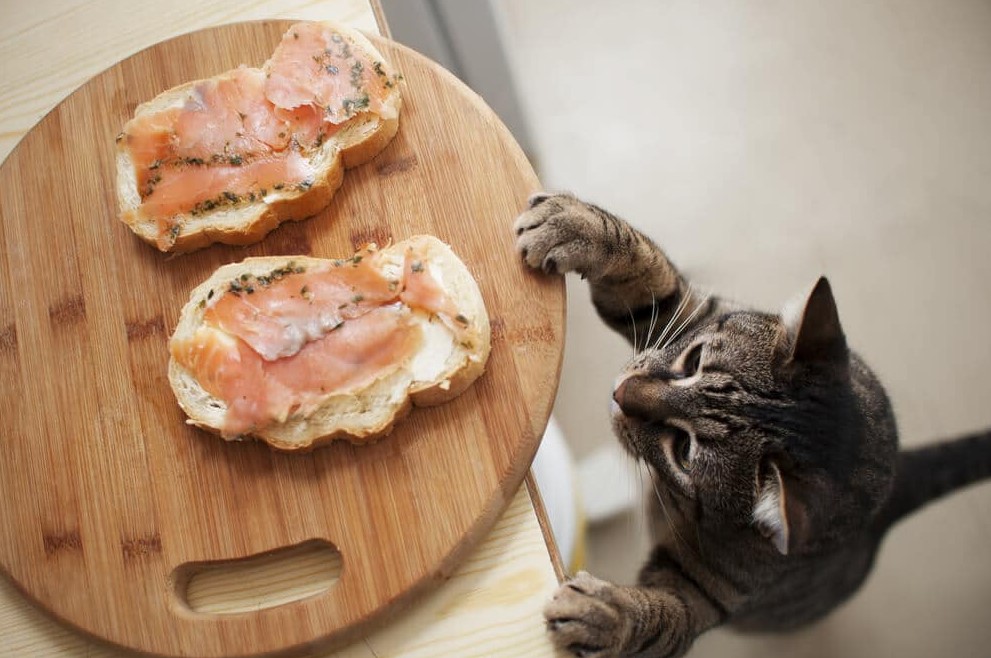When it comes to foods that are truly poisonous to cats, the list is thankfully quite short. However, some foods that are traditionally associated with cats can actually cause more harm than good: think of the proverbial saucer of milk.
In this article, we’ll uncover the most common foods poisonous to cats as well as products that may seem healthy but which might actually irritate your cat.
Let’s look first at the everyday ‘human’ foods that can be seriously toxic to our feline friends.
Foods Truly Poisonous To Cats
While very few foods are toxic to cats, some foods, like chocolate, are truly poisonous. If your cat has ingested one of these foods, make an emergency call to your vet clinic.
The following seven foodstuffs can be seriously toxic to cats if ingested and all necessitate an emergency call to your vet clinic.
1. Onions, Garlic, & Chives
All of these foods form part of the Allium plant family and contain sulphoxides, the component that gives them their uniquely strong odour and taste.
What Happens If Your Cat Eats Onions, Garlic, Or Chives?
In cats, when these sulfur-containing compounds are broken down by the body and absorbed into the bloodstream, they cause damage to red blood cells. In severe cases, the red blood cells will rupture and release damaged haemoglobin proteins called Heinz Bodies, which can in turn lead to anaemia and even kidney damage.
Cats are more sensitive to onion toxicosis than dogs and initial clinical signs can be very vague and non-specific. Initially an affected cat may develop vomiting and/or diarrhea accompanied by loss of appetite.
Anemia can start to develop as soon as 12 hours after eating the onion/garlic/chive substrate, but normally there is a delay of 2-5 days.
It is during this time that you may notice your cat becoming quite lethargic, depressed and disinterested in normal activities. Also remember that any member of this plant family can cause toxicity to your cat regardless of whether it is in powdered, cooked, raw, or dehydrated form.
2. Xylitol
This is an artificial sweetener used in many human foods and other products, including chewing gum, sweets, nut butters, bakery goods, diabetic foods and toothpaste.
What Happens If Your Cat Eats Xylitol?
When it is eaten by cats, xylitol can cause an abnormal increase in insulin release from the pancreas, which in turn leads to a decrease in overall blood sugar levels.
Early signs of a xylitol problem are lethargy, vomiting and loss of muscle coordination, but without rapid treatment this can progress to cause liver failure and seizures.
3. Chocolate
Some foods, like chocolate, are truly poisonous to cats.
Chocolate contains a compound called theobromine, which is part of the methylxanthine family of compounds.
What Happens If Your Cat Eats Chocolate?
If it is eaten by your cat it can rapidly cause stomach upset; hyperactivity; adversely impact the kidneys and the nervous system, as well as trigger an abnormal heart rhythm. In the worst-case scenario it can be fatal.
Dark chocolate, cocoa powder, cocoa butter, and cocoa beans are the most dangerous types of chocolate as they contain the highest levels of theobromine compared to milk or even white chocolate.
Sadly, dark chocolate is also the most likely type of chocolate to appeal to your cat, as it has a bitter taste.
4. Coffee Pods, Beans, Grounds & Caffeinated Energy Drinks
Caffeine is another member of the methylxanthine family of compounds.
What Happens If Your Cat Eats Coffee Or Another Caffeinated Drink?
In cats, caffeine ingestion affects the bowels, kidneys, nervous and cardiovascular systems and can be fatal if left untreated.
Another risk for cats is that caffeine tastes bitter, which makes it very appealing to cats. Be aware that caffeine is present in many energy drinks and colas. Additionally, the potentially lethal effect may be exponentially worsened if it is contained in cocoa and chocolate.

5. Alcohol
Alcohol should never be offered to any pet. They metabolise it similarly to us humans, but as it is dose dependent on the size of the animal, it can be rapidly fatal for cats.
What Happens If Your Cat Consumes Alcohol?
Alcohol can cause vomiting, diarrhoea, decreased coordination and a depressed central nervous system. If left untreated it can lead to breathing difficulties, tremors, change the pH of blood and induce coma or seizures, ultimately resulting in death.
Alcohol isn’t always obviously presented as a beverage either, as it can be contained in many ‘normal’ household items including raw yeast for baking bread and rotting/fermenting fruit.
During these unprecedented COVID times please also be especially aware of not leaving alcohol hand gels and rubs near where curious cats might try to investigate.
6. Grapes, Raisins, & Currants
Similar to the Allium plant family, grapes contain a compound as yet unidentified, which affects the kidneys and can lead to sudden renal failure.
What Happens If Your Cat Eats Grapes, Raisins, Or Currants?
Repeated vomiting and hyperactivity can be early signs of poisoning and an emergency trip to the vet is essential. Remember too that raisins and currants can be present in raisin bread and trail mix.
7. Mouldy Food
If food goes mouldy it can lead to the production of specific poisons called mycotoxins and aflatoxins.
What Happens If Your Cat Eats Mouldy Food?
Aflatoxins and mycotoxins cause different symptoms in cats, but if left untreated can be fatal. Specific care needs to be taken with blue cheese, fallen fruit, stale bread, and other decaying organic matter.
